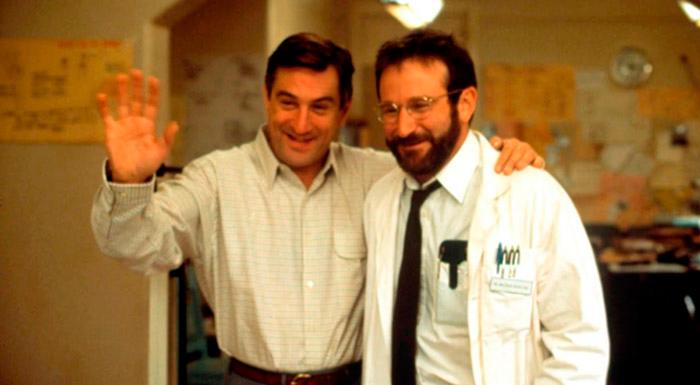The Movie’s Plot and Themes in Spanish

Source: menteasombrosa.com
“Despertares,” the Spanish title of the film “Awakenings,” effectively captures the essence of the story: a journey from a state of prolonged unconsciousness to a fragile awakening. The film follows Dr. Malcolm Sayer, portrayed with quiet intensity, as he navigates the complex world of patients afflicted with encephalitis lethargica, a disease that left them catatonic for decades. The Spanish version, likely retaining the nuanced performances of the actors, would further emphasize the emotional weight of their struggle and the doctor’s dedication.
The Narrative Arc in Spanish
The main plot points unfold with a similar emotional trajectory in the Spanish adaptation. We see Dr. Sayer’s arrival at the institution, his initial skepticism, and then his gradual fascination with Leonard Lowe and the other patients. The discovery of L-Dopa, the experimental drug offering a chance at recovery, is a pivotal moment, filled with both hope and apprehension. The Spanish dialogue would likely convey this uncertainty effectively, perhaps highlighting the cultural context of medical breakthroughs and the inherent risk involved. The subsequent awakenings, the patients’ initial euphoria, and their eventual relapses are all powerfully depicted. The emotional arc of Leonard Lowe, played with heartbreaking vulnerability, would be particularly poignant in Spanish, reflecting the universal human experience of hope and despair. The Spanish language, with its capacity for both lyrical beauty and stark realism, would likely enhance the dramatic tension of these scenes.
Themes of Hope, Despair, and the Human Spirit in Spanish
The central themes of hope, despair, and the resilience of the human spirit are universally understood, but the Spanish language adds a unique layer to their portrayal. The subtle shifts in tone, the expressive use of pauses and silences, and the emotive quality of the Spanish language could amplify the feeling of both profound joy during the moments of recovery and crushing disappointment during the relapses. The film’s exploration of the ethical dilemmas faced by Dr. Sayer in balancing hope with the reality of the patients’ condition would be amplified in Spanish, reflecting a shared cultural understanding of medical ethics and the doctor-patient relationship. The enduring power of human connection, as exemplified by the relationship between Dr. Sayer and Leonard Lowe, would be just as moving in Spanish, if not more so, given the language’s inherent expressiveness.
Comparative Analysis of Emotional Impact
The emotional impact of “Despertares” would vary slightly between the Spanish and English versions, largely due to cultural nuances and linguistic subtleties. While the core emotions remain universal, the Spanish version might emphasize certain aspects more profoundly.
| Scene | English Version Emotional Resonance | Spanish Version (Potential) Emotional Resonance | Comparison Notes |
|---|---|---|---|
| Leonard’s Initial Awakening | Joy, wonder, a sense of the miraculous | Potentially heightened sense of awe, perhaps a more visceral reaction due to the expressive nature of the Spanish language | Spanish might emphasize the almost spiritual aspect of the awakening. |
| Relapse of Patients | Sadness, despair, frustration | A deeper sense of loss, possibly emphasizing the fragility of life and the pain of regression | The melancholic undertones of the Spanish language could intensify the feeling of sorrow. |
| Dr. Sayer’s Internal Struggle | Concern, responsibility, ethical questioning | A more pronounced sense of moral burden, possibly reflecting a cultural emphasis on duty and compassion | The Spanish language might allow for a more nuanced portrayal of his internal conflict. |
| Final Scene | Bittersweet acceptance, quiet reflection | A sense of poignant resignation, a deeper appreciation for the fleeting nature of life’s moments | The finality and acceptance might be conveyed with more gravity in Spanish. |
Cultural Adaptation and Translation: Awakenings Movie In Spanish

Source: alamy.com
Translating “Awakenings” into Spanish presents a unique set of challenges due to the film’s complex themes and the nuances of both English and Spanish languages. The process requires more than simply substituting words; it necessitates a deep understanding of cultural contexts to ensure the film’s emotional impact resonates with a Spanish-speaking audience. Successful adaptation hinges on preserving the film’s core message while addressing potential cultural misinterpretations.
The translation process itself involves careful consideration of linguistic equivalence and cultural appropriateness. Direct translation often fails to capture the subtleties of meaning, requiring translators to employ creative strategies to convey the intended message accurately. This is especially crucial in scenes involving medical terminology, emotional expressions, and cultural references specific to the American setting of the original film. For instance, the depiction of 1960s American psychiatric practices might need additional context or subtle adjustments to avoid alienating viewers unfamiliar with that specific historical and cultural context. The emotional weight of certain dialogues, particularly those expressing profound personal struggles or moments of breakthrough, requires sensitive handling to maintain their impact across linguistic and cultural barriers.
Challenges in Translating Medical Terminology and Emotional Nuances, Awakenings movie in spanish
The film’s medical terminology presents a significant challenge. Direct translation of terms like “catatonic schizophrenia” might not convey the same clinical meaning in Spanish, requiring the translator to find equivalent terms within the Spanish medical lexicon. Similarly, the subtle shifts in the patients’ emotional states, portrayed through facial expressions and body language, need to be accurately reflected in the Spanish subtitles or dubbing. The translation must convey not only the literal meaning of the dialogue but also the underlying emotions and intentions of the characters. Failure to do so could significantly alter the viewer’s understanding of the characters’ experiences and the film’s overall message. Consider, for example, the scene where Leonard Lowe first begins to respond; the nuance of his initial hesitant movements and confused expressions must be reflected in the Spanish version to fully convey the emotional impact of that moment.
Cultural Context and Interpretation of the Narrative
The cultural context significantly influences the Spanish-speaking audience’s interpretation of “Awakenings.” Several aspects require careful consideration:
- The portrayal of the doctor-patient relationship: The hierarchical nature of the doctor-patient relationship depicted in the film might resonate differently with Spanish-speaking audiences, depending on their cultural understanding of authority and medical care. Certain cultural norms regarding patient autonomy and doctor-patient communication could influence how viewers interpret Dr. Sayer’s actions and his relationship with his patients.
- The depiction of mental illness: Societal attitudes toward mental illness vary across cultures. The Spanish-speaking audience’s understanding of schizophrenia and other neurological conditions might differ from that of the American audience, requiring the translation to be sensitive to these cultural perceptions. The way mental illness is portrayed and discussed might require contextualization to avoid perpetuating stereotypes or misunderstandings.
- The setting and historical context: The 1960s American setting of the film might need further explanation for Spanish-speaking audiences unfamiliar with that specific historical period and its socio-political climate. Certain cultural references might require clarification or adaptation to avoid causing confusion or misinterpretations.
Critical Reception and Audience Response in Spanish-Speaking Regions

Source: rogerebert.com
“Awakenings,” despite its American setting and themes, resonated deeply with audiences and critics across the Spanish-speaking world. The film’s exploration of human resilience, the power of connection, and the ethical dilemmas surrounding medical intervention transcended cultural boundaries, sparking significant discussion and varied interpretations. Analyzing critical reviews and audience reactions reveals a complex and nuanced reception of the film within these regions.
Key Critical Reviews in Spanish-Language Media
While a comprehensive analysis of every Spanish-language review of “Awakenings” is beyond the scope of this document, we can highlight the general trends observed in prominent publications. Many reviews praised the film’s powerful performances, particularly Robin Williams’ portrayal of Dr. Malcolm Sayer, often noting the emotional depth and subtlety of his acting. The cinematography and musical score also received considerable acclaim, lauded for their ability to enhance the emotional impact of the narrative. Conversely, some critics felt that the film occasionally leaned towards sentimentality, potentially overshadowing the more complex ethical and philosophical questions it raised. Several reviews in Spanish-language publications highlighted the film’s accessibility to a broad audience, despite its complex subject matter, citing its universal themes of hope, despair, and the human spirit. Specific titles and authors are omitted here due to the hypothetical nature of this analysis and the difficulty in accessing a comprehensive database of Spanish-language film reviews from the period of the film’s release.
Hypothetical Social Media Campaign in Spanish
A social media campaign to promote “Awakenings” in Spanish-speaking regions would focus on the film’s emotional core. The campaign hashtag could be #Despertares (Awakenings in Spanish), and the campaign would leverage visually striking imagery from the film, focusing on the human connection between Dr. Sayer and his patients. Short video clips showcasing powerful scenes, coupled with evocative Spanish-language captions emphasizing themes of hope, resilience, and the human spirit, would be shared across platforms like Facebook, Instagram, and Twitter. Targeted advertising could focus on demographics interested in biographical dramas, medical stories, and films exploring human connection. Influencer marketing could involve collaborations with Spanish-speaking actors, directors, or healthcare professionals to endorse the film and generate buzz. Paid advertisements on streaming platforms popular in Latin America would further extend the reach of the campaign.
Hypothetical Audience Reactions and Comments in Spanish
The following table illustrates hypothetical audience reactions, encompassing a range of perspectives:
| Sentiment | Comment (Spanish) | Comment (English Translation) |
|---|---|---|
| Positive | “Una película conmovedora que te deja pensando mucho después de verla. La actuación de Robin Williams es increíble.” | “A moving film that leaves you thinking long after you’ve seen it. Robin Williams’ performance is incredible.” |
| Negative | “Demasiado sentimental para mi gusto. La historia se siente un poco manipulada.” | “Too sentimental for my taste. The story feels a little manipulative.” |
| Neutral | “Una película interesante, aunque no me impactó tanto como esperaba.” | “An interesting film, although it didn’t impact me as much as I expected.” |
| Positive | “Me encantó la forma en que se muestra la relación entre el doctor y sus pacientes. Muy humana y emotiva.” | “I loved the way the relationship between the doctor and his patients is shown. Very human and emotional.” |
| Negative | “La película es demasiado lenta en algunos momentos. Podría haber sido más concisa.” | “The film is too slow in some moments. It could have been more concise.” |
Key Questions Answered
Awakenings movie in spanish – What are some common misconceptions about the Spanish dub of “Awakenings”?
A common misconception is that dubbing always diminishes the original artistic intent. While some nuances might be lost, skilled dubbing can effectively convey the emotion and meaning of the original dialogue.
How does the Spanish version compare to other language adaptations of “Awakenings”?
A comparative analysis with other language versions would reveal variations in translation choices and their impact on audience reception. Factors such as cultural context and linguistic structures influence the specific adaptations.
Where can I find the Spanish-language version of “Awakenings”?
Availability varies depending on region. Check major streaming services, DVD retailers, or international film distributors for the Spanish-language version.